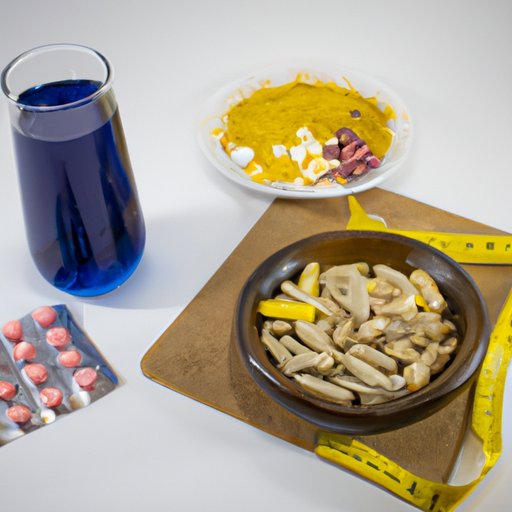
I. Introduction
Estrogen is a hormone that plays a vital role in a woman’s overall health and well-being. It is responsible for regulating a woman’s menstrual cycle, bone health, and even mood. Decreased estrogen levels are common in women who are approaching menopause, but they can occur at any age due to factors like stress, poor diet, or a sedentary lifestyle. The good news is that there are multiple ways to boost estrogen levels naturally without turning to medication.
II. Diet
One way to naturally increase estrogen levels is by incorporating certain foods into your diet. Legumes, soy products, flaxseed, and whole grains are all rich in phytoestrogens. Phytoestrogens are plant compounds that act like estrogen in the body, increasing your overall estrogen levels. For example, adding edamame to your salad or having a bowl of oatmeal with flaxseed for breakfast are simple ways to incorporate these estrogen-boosting foods into your diet.
Additionally, eating a well-balanced diet, including plenty of fruits, vegetables, and lean protein sources, will help maintain overall health and hormone balance.
III. Exercise
Regular exercise is another way to boost estrogen levels naturally. Weight-bearing exercises, such as weightlifting, jogging, and even brisk walking, stimulate estrogen production. Studies show that postmenopausal women who engage in regular exercise have higher estrogen levels than those who do not.
Try to include weight-bearing exercises into your workout routine three to four times a week. Mix it up with exercises like squats, lunges, or resistance band workouts.
IV. Hormone Replacement Therapy (HRT)
For women with depleted estrogen levels, hormone replacement therapy (HRT) can be a useful option. HRT involves taking estrogen and progestin hormone supplements to balance hormone levels. There are different types of HRT available, including pill, skin patch, and vaginal cream. HRT can help alleviate symptoms like hot flashes, vaginal dryness, and mood swings.
However, HRT does come with some potential risks and side effects, such as an increased risk of developing blood clots and breast cancer. Women who are considering HRT should talk to their doctor about the benefits and risks before starting treatment.
V. Stress Management
Chronic stress can negatively impact the body’s hormone production, including estrogen. When you’re stressed, cortisol, the stress hormone, can interfere with estrogen’s production. Therefore, reducing stress levels is essential for maintaining hormone balance and overall health.
Techniques for reducing stress include meditation, deep breathing exercises, and yoga. Incorporating self-care activities like reading, taking a relaxing bath, or engaging in hobbies you enjoy can be an effective stress-reducing technique as well.
VI. Weight Management
Excess body fat can lead to elevated estrogen levels, which can cause hormone imbalances. Maintaining a healthy weight can help keep hormones balanced. When we maintain a healthy weight, our body’s hormonal systems work more efficiently, reducing the risk of hormonal imbalances.
To achieve and maintain a healthy weight, it’s important to have a regular exercise routine and healthy eating habits. Try incorporating a combination of weight training and cardiovascular exercise, as well as eating a balanced diet consisting of lean protein, whole grains, fruits, and vegetables.
VII. Herbs
Certain herbs have been shown to help increase estrogen levels. Some of these herbs include red clover, black cohosh, and dong quai. These herbs contain phytoestrogens, compounds that mimic the effects of estrogen in the body. However, it’s essential to remember that herbs can also have side effects, and they may not be safe for everyone, particularly those taking other medications.
Before taking any herbal supplements, it’s crucial to speak to a healthcare professional to discuss potential interactions with other medications and to ensure they are safe to consume.
VIII. Vitamins and Minerals
Finally, incorporating certain vitamins and minerals into your diet can help boost estrogen levels. Zinc, vitamin C, and vitamin E are all essential for healthy hormone production. Zinc can help with the production of follicle-stimulating hormone (FSH), which stimulates estrogen production. Vitamin C helps to regulate estrogen synthesis, and vitamin E improves estrogen metabolism.
Eating a diet rich in zinc, vitamin C, and vitamin E is the best way to incorporate these nutrients into your diet, although supplements are also available. However, as with any supplement, it’s essential to speak to a healthcare professional before starting to take them.
IX. Conclusion
Boosting estrogen levels naturally is essential for maintaining overall health and well-being. By incorporating certain foods into your diet, engaging in regular exercise, reducing stress levels, and maintaining a healthy weight, you can help keep your hormones in balance. Herbs and supplements may also be helpful but should be used with caution and under the guidance of a healthcare professional. If natural approaches are not effective, talk to a healthcare professional about other options, such as HRT.
By making these modifications in your lifestyle, you can help keep your hormone levels balanced, improve your overall health, and feel your best.





